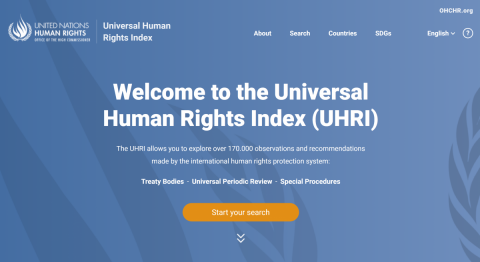
Welcome to the Universal Human Rights Index (UHRI)
The UHRI allows you to explore over 170.000 observations and recommendations made by the international human rights protection system:
Treaty Bodies-Universal Periodic Review-Special Procedures
What information can I find in the
UHRI?
The UHRI facilitates access to human rights recommendations issued by three key pillars of the
United Nations
human rights monitoring system: the Treaty Bodies established under the international human
rights treaties as well as the Special Procedures and the Universal Periodic Review (UPR) of the
Human Rights Council. Learn more about the human rights mechanisms – Click Here
The users can produce overviews of recommendations by region, country, human rights themes,
concerned groups and by Sustainable Development Goals (SDGs) and targets, as well as to perform
text searches and advanced searches by using filters. For more information and search tips, Click Here
Who is the UHRI for?
UHRI is a central repository of human rights information and aim at assisting States in the
implementation of these recommendations and to facilitate the work of national stakeholders such as
National Human Rights Institutions (NHRIs), non-governmental organisations, civil society and
academics as well as the United Nations in support of such implementation efforts and for human rights
analysis including to identify who may be at risk of being left behind and mapping of systematic,
recurring and unresolved human rights issues.










Add new comment